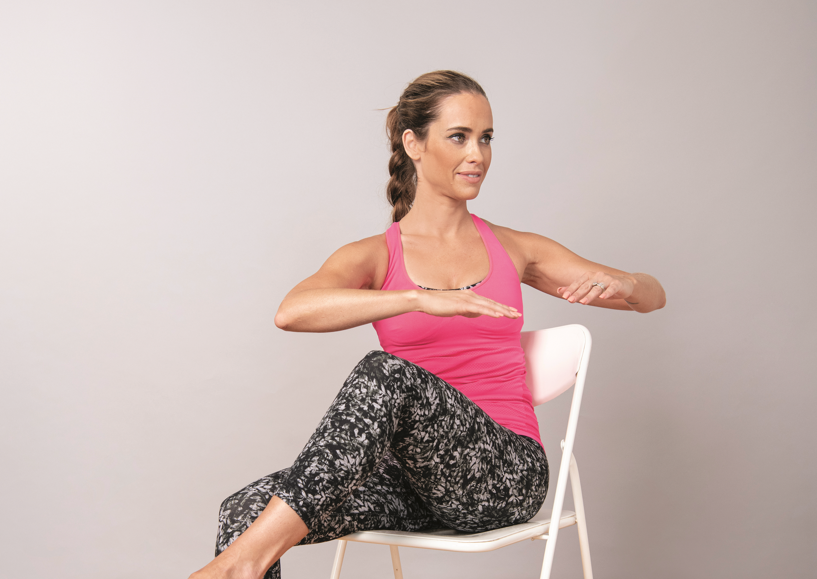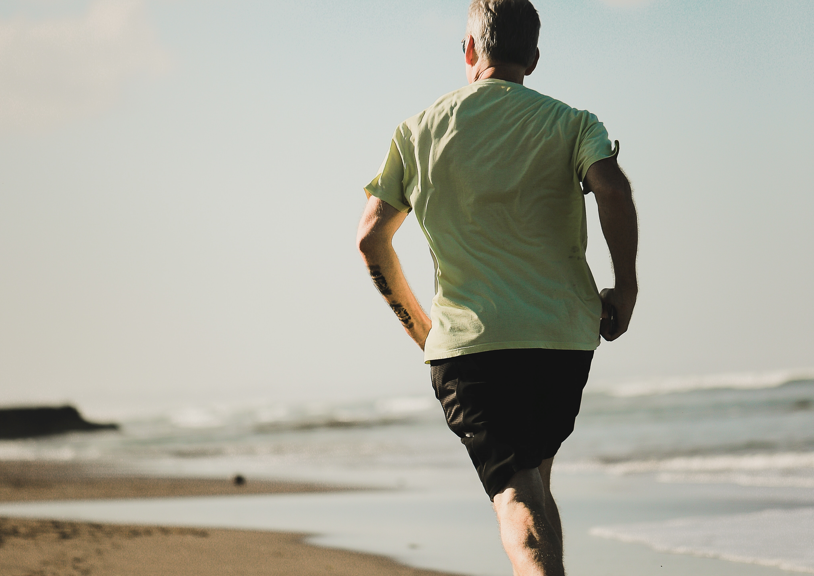It’s natural to gain some weight as we get older, but that doesn’t mean having to grin and bear it
By Wendy Haaf
While there are certainly advantages to getting older, when it comes to maintaining a healthy weight, nature isn’t exactly on our side. For one thing, the number of calories it takes to keep the body’s essential systems (such as breathing and digestion) at rest—also known as our basal metabolic rate—tends to drop with age. Why?
“We lose about five to 10 per cent of muscle mass every 10 years,” says Dr. Tony Chetty, the medical director of the bariatric clinic at St. Joseph’s Healthcare Hamilton (ON) and an associate professor of pathology and molecular medicine at McMaster University. That’s significant, since muscle uses more energy—that is to say, calories—than fat.
And since “we typically just continue to eat the same and have the same type of activity level, if not less activity, slowly over time, you have this net energy gain, so you slowly pack on the pounds,” says Jennifer L. Kuk, an associate professor at the School of Kinesiology and Health Science at Toronto’s York University. “On average, as a nation, we gain about a pound or two a year, but often you don’t really notice it until you look back decades later.”
Unfortunately, this extra weight is usually stored as fat, a proportion of which is the visceral fat (the fat around the organs in the abdomen) that’s strongly linked with an increased risk for a number of chronic conditions, including diabetes and heart disease.
There are, however, some simple steps that can help fight the tendency towards that gradual gain and reduce the chances of you developing the health problems that often accompany it. (You can help gauge your risk right now by measuring your waist circumference or asking your primary care provider to do so. According to Heart and Stroke Foundation of Canada, a measurement of more than 37 inches for males or more than 31.5 inches for females means an increased risk for diabetes, heart disease, and stroke.)
Step up and resist.
Those of us who spend a good deal of the day sitting have good reason to get up and move—even just a little more than we do currently. “Being completely inactive actually increases your appetite,” Kuk explains, “so your body is not as good at regulating your calories in and out. Incorporating even just a bit more physical activity in your life is really important for that purpose.” Obviously, “it shouldn’t be something you hate or that’s really inconvenient,” or you won’t stick with it, she adds. Walking is an easy, free option that many people can enjoy. One painless way to trick yourself into walking more is taking public transit. Studies have shown that “taking the bus instead of driving is going to force you to take more steps,” Kuk notes. Bonus: Both exercise and outdoor light are natural mood-boosters.
Ideally, at least some of the physical activity you fit into your day should be what’s known as “resistance exercise”—the type that maintains and builds muscle mass.
“We encourage patients to use the elastic bands that you can buy,” St. Joseph’s Healthcare Hamilton’s Dr. Chetty says. “Or if you have access to weights, that would be good, too.” You can even start out by using your own body as a sort of barbell. (Two websites where you can find DIY resistance-exercise programs are osteoporosis.ca and diabetes.ca.) Do a few sets every time there’s a commercial break in your favourite one-hour program and you’ll have worked out for more than 20 minutes! (Remember: Regardless of whether you lose weight, exercise tends to help shrink abdominal fat mass, as well as help to prevent or at least manage health issues such as high blood pressure.)
Adjust your eating habits.
Resistance exercise is just half of the equation for maintaining and building muscle; to do that job, your body needs adequate protein. “For patients over 60, we recommend that at least 30 per cent of your calories be protein,” Chetty says. “And it doesn’t have to be animal protein, it can be plant protein.” Sources of plant protein include legumes, beans, nuts, and seeds.
However, consuming the majority of your protein in the evening meal, as North Americans typically do, isn’t the best approach. “The research shows that particularly as you get older, spreading your protein throughout the day is critical to maintaining muscle mass,” says Rosie Schwartz, a Toronto-based registered dietitian and nutrition writer. (You can find her blog at rosieschwartz.com.)
Aiming for 0.7 ounces (20 grams) of protein at each meal—particularly breakfast—is a good start. What does that look like? A ¾-cup (175 mL) serving of Greek yogourt topped with two tablespoons (25 mL) of hemp seed; two slices of rye toast with three tablespoons (50 mL) of peanut butter and one tablespoon (15 mL) of chia seeds; or a breakfast burrito (a large whole wheat tortilla) filled with half a cup (125 mL) each of black beans and spiced tofu. Other good options that require minimal prep are eggs, cheese, and tinned fish. Small between-meal snacks containing protein and at least two other food groups (such as whole grains, fruits, and vegetables) can help fill in the gaps.
Another benefit of distributing your food intake more evenly throughout the day: “If you go too long without eating, you don’t feel satisfied,” Schwartz explains, so you’re more likely to overeat. “Also, if you go longer without eating, you tend to have higher insulin levels, which promote weight gain.”
However, you should consider putting an end to after-dinner snacking (unless an evening medication needs to be taken with food). “Eating after 8 p.m. has been shown to increase the likelihood those calories are going to be stored as fat mass,” York University’s Jennifer L. Kuk notes.
At the same time, cutting back on sources of empty or nutrient-poor calories—the two main culprits being sugar-sweetened beverages and highly processed foods—can help with weight control. “Sugary beverages don’t make you full, so they’re really added calories on top of what you normally eat,” Kuk says. (The jury is out on whether low-cal sweeteners are good or bad, but if you really need that sweet fix, either limiting the amount of sugar or using a sugar substitute is a reasonable choice.)
Preparing simple meals from scratch (yes, sandwiches count!) and either leaving tempting treats at the store or buying single-portion versions (mini-chocolate bars, for instance) can also help keep a lid on calories. “Portion size has been shown to influence how much you eat, independent of hunger,” Kuk says. Similarly, serving foods on smaller plates tricks your brain into eating less.
Choosing foods that you like is important, too. While Kuk dryly acknowledges that the results of a recent multi-million-dollar study are hardly surprising, the research showed “that people will stay on their diet longer if they enjoy it.” Consequently, she says, “you should focus on eating as healthily as you can, within your means, and not depriving yourself.”
Take stock of medications.
One often-overlooked piece of the weight-management puzzle is certain prescription drugs.
“Some medications that patients are taking can contribute to weight gain,” Chetty explains, “especially certain antidepressants and diabetes medications.” Consequently, it’s worth asking your doctor whether any of your prescriptions could promote weight gain, and if so, whether there are any other, weight-neutral options.
Take stress and sleep seriously.
Stress and sleep are also underappreciated factors in weight management, according to Chetty and Kuk. “How do we decrease stress? Mindfulness meditation and yoga definitely help,” Chetty says.
As for sleep, “when you don’t get enough, your stress hormones kick in, and that can put on weight, as well,” Chetty says. “You need about seven to eight hours of sleep, and it’s not only the duration, it’s the consistency—as in, going to bed at the same time each night.”
Hitting the sack a bit earlier may be helpful, too. Since your exposure to food increases the longer you stay awake, Kuk has the following suggestion: “Go to bed before you start to get hungry and want that midnight snack.”
Focus on health, not weight.
What if your weight is already higher than is considered healthy for someone of your height? First, waist circumference is a better yardstick for chronic disease risk than body mass index (BMI, which is calculated by dividing weight in kilograms by height in metres squared). “BMI is not a very accurate measure as we age, because we tend to lose height and muscle mass [which is heavier than the equivalent amount of fat],” Chetty says.
Then there’s the fact that once you pass a certain age, carrying some extra weight may not be a bad thing. “We did a study in which we looked at people 75 or older, and you actually see a reverse relationship between obesity and premature-mortality risk,” Kuk says. “People with obesity are more likely to get chronic conditions, but they’re also more likely to survive those conditions. What that means is, with a heart attack, cancer, or severe pneumonia, the patient with obesity is more likely to survive than someone of healthy weight because that patient has a metabolic reserve.”
Still, it makes more sense to focus on behaviours that promote good health than on the number on the scale or measuring tape.
“The main reason people want to lose weight is the social stigma and bias that are associated with having a higher body weight,” Kuk says. And not only do shame and embarrassment not help people lose weight (if they did, few would be overweight or obese), they can have the opposite effect.
“We did a study looking at weight discrimination,” Kuk says, “and found that people who have experienced more weight discrimination want to lose more weight, but they’re less successful at it,” not to mention being more likely to resort to drastic and potentially dangerous methods in the attempt. (Weight-loss supplements, for instance, have been linked with deaths around the world, and some have been shown to contain drugs that have been banned in Canada due to the associated risks.) Consequently, Kuk emphasizes, “We really need to strive to be the healthiest we can be at the weight we’re at and stop judging people based on their weight, because ‘thin’ doesn’t necessarily mean ‘healthy.’”
Photo: iStock/Ljupco.






